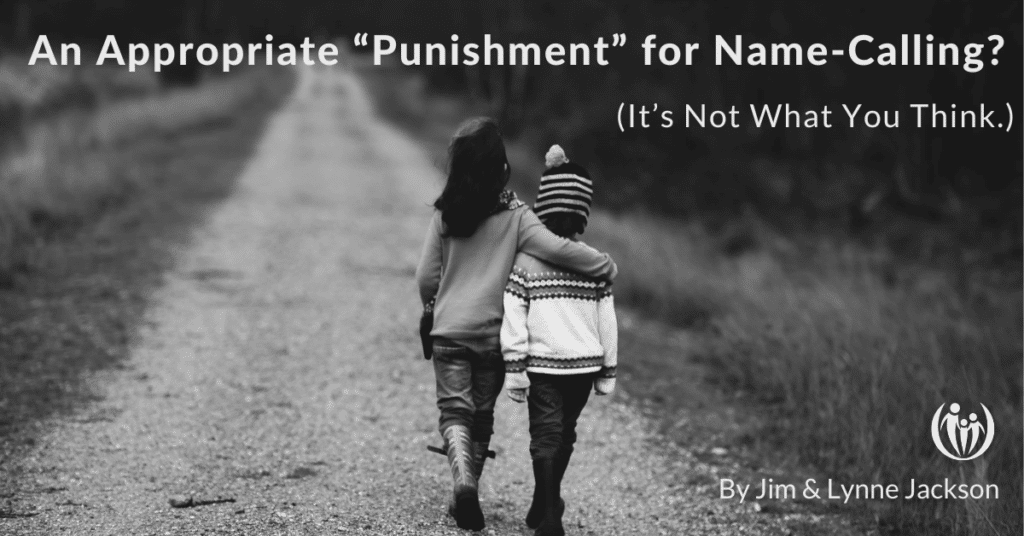
An Appropriate “Punishment” for Name-Calling? It’s Not What You Think
Teach connection and reconciliation with this simple policy

Name-calling might be one of the most annoying (but also quite hurtful) phases some kids go through. Lynne still remembers the label “stupid” from a pair of her older siblings.
When name-calling gets going, your first thought might be, “Just make it stop!” But, as every parent knows, trying to “stop” the name-calling doesn’t usually end well. However, letting this continue doesn’t end well either…
“You’re dumb!”
“No, YOU’RE dumb!”
“Well, you’re a loser!”
“I know you are, but what am I?”
“You’re a butthead!”
“MOMMMMMMMMM!!!!
Once kids get on a roll of slinging names back and forth, a meltdown becomes almost inevitable. So, how do you stop the name-calling? (Without your kids whispering more insults under their breath when they think you’ve turned away.) There is another way. With some thoughtful and compassionate intervention, you can help your kids turn their hurtful words into an opportunity to connect and build even stronger relationships.
Can you stop the name-calling?
Here’s the truth: you can’t stop the name-calling. Your intense efforts to do so may actually fertilize the behavior with your big energy and attention. Until your children have the executive function to think through all the reasons why name-calling isn’t a helpful tool in solving conflict, they’ll probably keep at it. To elevate shaky self-esteem, they may also be using it to help feel better about themself.
However, you can help them begin to feel the effect and power of their words and even how much better it feels to use kind words.
A good “punishment” for name-calling?
If you’re searching for punishments, you might not initially resonate with what our family implemented. But kids have the best shot at learning wisdom when they’re not locked in an argument about punishment.
Building wisdom involves helping your child realize that no one “wins” when two people hurl insults at each other. The best learning opportunities often come from pointing out and discussing the natural impacts of a child’s decision. (“Hey, you seem sad that Jessi doesn’t want to play with you now. Why do you think she decided to leave?”)
Instead of focusing on a “punishment” for name-calling, it’s more helpful to focus on guiding kids to mend what they’ve broken – to repair the rift in the relationship caused by the name-calling. You can try this approach of teaching kids to make right what they’ve made wrong.
The “4 Kind & True Things” Approach
Years ago, we heard that it takes four positive (or kind) statements to “undo” one negative (or unkind) statement. (Research ranges from a 3:1 positive to negative feedback ratio to a 5:1 ratio.) With this in mind, our family implemented a “four kind and true things” approach. Each time one of the kids said something unkind and untrue (“You’re STUPID!”), they were graciously encouraged to calm down until they were ready to “make it right”. Once they were calm, they were empowered to come up with four kind and true statements toward the person they had wronged.
Over time, they did this without our intervention. Now, as adult siblings, they are close friends with each other. In addition, they are better equipped to solve conflict well in their marriages and outside relationships.
This approach may sound simple, but there is quite an art to growing hearts of true reconciliation instead of just forcing a legalistic process.
Laying the groundwork for “4 Kind & True Things”
A shift in parenting can easily backfire if you grab a tip or technique off the internet and use it without preparing your kids’ hearts. It can communicate, “I’m still opposing you, and now I’ve got new tricks to put a stop to your bad behavior.” That’s probably not what you’re hoping to communicate to your child.
Here are some proactive ideas that can help prepare your family for sincere reconciliation:
- Start with your heart. Are you entering name-calling situations with frustration, anxiety, and judgments? Or with grace? Do you value true reconciliation? What have you learned about making it right when you’ve said something hurtful? Have you modeled that well in your relationships with other adults, and especially with your kids? Ask God to grow a gracious, reconciling heart in you! (See Matthew 5:23,24)
- It helps to shift your belief from, “My child is being wounded by these awful things being said to them, and it needs to STOP!” to, “This is a great opportunity to help my child learn to stand strong in the truth about themselves!” (See this blog post for ideas.)
- Talk about and model do-overs. Do-overs are a practical way to start building a culture of reconciliation. When you celebrate how much better a do-over has made you feel, and you do that on numerous different occasions, kids will probably start wanting a piece of the reconciliation action.
- Teach kids about their true identity. Kids have the inherent value given by God! (You may even want to play this song on repeat!) You can talk about how they are created in the image of God, and so loved by Him. Nothing anyone says about them can change that. This can help decrease the reactivity that fuels the mudslinging contests.
- Take advantage of everyday successes and failures to make this essential truth about kids’ identity practical for them: “Wow, you must have worked hard to get those grades! Do you think we love you more because of this?” Or, conversely, “Hmm, that looks like it didn’t go as you were hoping. Do you think this makes us love you less?”
- Read Ephesians 4:15 about speaking the truth in love, and ask, “What do you think it means to speak the truth in love?” “What would our family be like if we almost always spoke the truth in love to each other?” This was an anchoring verse for our family.
- Explain to your children ahead of time that you will be guiding them in a new process of healing any hurt from name-calling with four kind and true statements. Clarify that it isn’t meant to be punitive but to encourage restored relationships. This simple video may help explain it.
As kids receive your graceful encouragement and begin to believe in their identity, they will be more open to making things right after verbally hurting someone.
We have a podcast about this!
Listen in as Jim and Lynne talk about their own parenting experience teaching true reconciliation within their family in Episode 140, “Restoring Relationships: Empower Kids to Want to Reconcile & Heal”
How to respond in the moment to name-calling
- Enter with empathy. The reality is this: Verbal abuse is as hurtful to the one speaking as it is to the one receiving. Often, the one calling names is frustrated and discouraged about their own identity and taking that out on someone else. They may feel even worse about themselves after they use those hurtful words.
- Stay curious about what is going on and avoid taking sides.“Wow, you must be really frustrated to say something like that! How can I help?” Sometimes, you don’t know what happened before you entered the scene.
- Buy some time or find a calming activity or distraction for everyone involved. Don’t try to force reconciliation when tempers are hot; it won’t go well because the brain functions needed to reconcile are “offline.” Encourage the “name-caller” to take the calming time needed to be sincere.
- Lighthearted, even humorous engagement is vital. It communicates, “No shame. You are loved no matter what, and I’m for you in this tough situation.”
- The first “kind and true” can directly address and correct the hurtful, untrue statement. (“You are not stupid.”)
- Ask your child to think of at least two that are fresh, new ideas to keep the process from becoming rote. (“You’re really good at reading. I’m glad you shared your Legos with me. You’re fun to play Uno with.”)
- If the “name-calling” child gets stuck, the “name-called” child can help by suggesting a few creative ideas about their strengths. (This put our kids on the same team and sometimes added some humor.🙂)
- Consider their natural bent: You know your child best. Does it work better for your child to express these ideas verbally, in writing, or by drawing a picture?
- Bring grace to the process if it all comes off the rails despite your best efforts. “I can see you’re still pretty upset.” You can focus on a good start or whatever part of the process went well. Or you can put any distracting privileges (like screens or friends) on hold until there is heartfelt reconciliation. (See our Consequences That Actually Work ebook.)
- Once kids have made things right with each other – celebrate the restored relationship! Give some high-fives all around. This could be a hug, a high-five, or even a special snack. You can also encourage a fun activity they can do together. (There are probably billions of adults who have never learned to reconcile well, and your kids have done something incredible!)
“Be kind and compassionate to one another, forgiving each other, just as in Christ, God forgave you.“
Ephesians 4:32
After name-calling, the long-term impact of reconciling
This approach flows from a constructive perspective: it is much more helpful to train than to punish. Interestingly, the child in our family who most often needed to complete “four kind and trues” has become the strongest affirmer of others.
One morning, we found a note he wrote spontaneously to his little brother. “Dear Noah, Thanks for being a neat, fun little guy who defuses conflicts wisely, says funny things all the time, is smart like crazy, and makes me a proud big brother.” (Wow, even more than four!)
Conflict may never be entirely eliminated if you have intense personalities in your family. But the blessing of this approach is that you will have the tools to return to a place of connection and joy, whatever the source of conflict!





